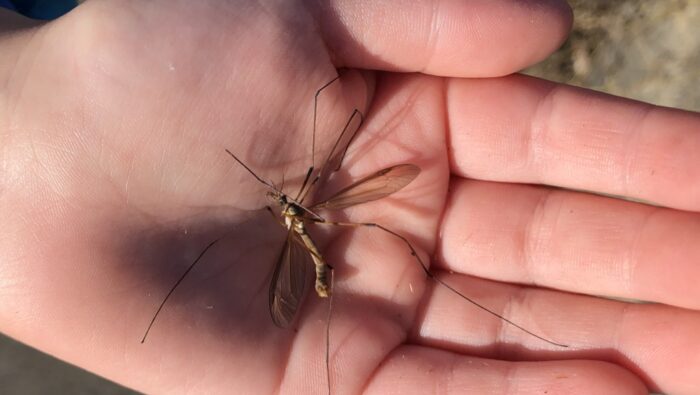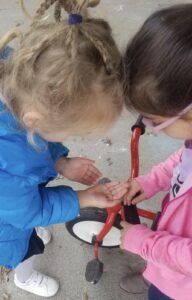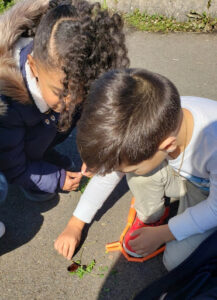
The teachers at Shaver Preschool, set an intention at the beginning of the year to support the children to learn what it means to care for one another, their materials, their teachers, and their community.
The teachers set up experiences inside and outside of the classroom to practice care. However, it was the unplanned for moments that provided the greatest opportunities to learn about caring.
From wooly bears, to crane flies and ladybugs… tiny creatures on the playground invited the children to slow down, look closely, and to use careful touching and thoughtful planning.

S: Stop stepping on the ants.
C: Ahhh, take that!
S: Stop!
C: Why?
S: They nice ants. You can’t follow me if you do that.
C: Ok, I’m sorry. I won’t.
S: Ok, but you can’t kill them or you can’t follow me.
 C: I really am sorry. We can build a home for them maybe?
C: I really am sorry. We can build a home for them maybe?
S: Yeah, that’s nice.
C: Let’s do it!
Seb: Come, come. Tienes que comer.
C: We need to feed him leaves. Get leaves everyone.
K: And grass!
C: He bites?
J: Not us.
M: No touch, no touch, friend.

This snapshot of a moment on the playground highlights two of the five habits of mind that teachers at Teaching Preschool Partners Demonstration Preschools track with observation and documentation: Collaborating with Others and Thinking Strategically.
This documentation also captures how children collaborate and build on one another’s ideas and reactions to come up with a plan of how to keep the insects safe.
Collaborates with others to accomplish a shared goal.
Traits: The child…
Includes others; shares resources; builds on the ideas of others; contributes ideas to a group work; recognizes the strengths and contributions of others; listens to others with interest, curiosity, empathy and understanding; demonstrates interdependent thinking that values a diversity of ideas that are alike and different from one’s own.
Thinks strategically, creatively and reflectively to follow an interest or tackle a challenge.
Traits: The child…
Gathers data through the senses and uses it to interpret experiences; playfully poses questions, designs and develops strategies to identify and take on intriguing problems/challenges; demonstrates flexible thinking and is willing to change based on new information; takes responsible risks to tackle challenges and make discoveries; learns from previous experiences; exhibits curiosity and imagination by creating novel ideas and solutions.